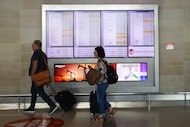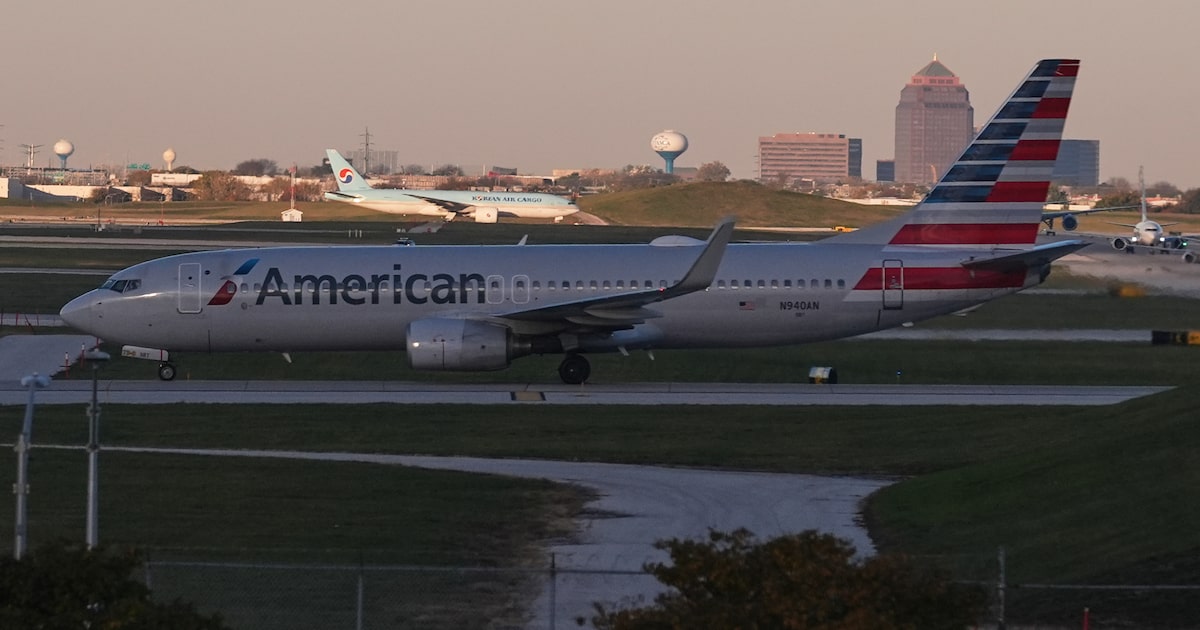The Federal Aviation Administration will reduce flights at DFW International Airport, Dallas Love Field and a swath of other major U.S. airports in an unprecedented move as the ongoing government shutdown wreaks havoc on the aviation sector, the FAA confirmed Thursday evening.
The U.S. Department of Transportation confirmed the “temporary” 10% flight reductions in an email Friday, adding that it will be spread out in phases.
A 4% flight reduction will take effect Friday, before increasing to 6% by Nov. 11, 8% by Nov. 13 and 10% by Nov. 14. International flights are not required to be included in the reduction, the department said, adding that carrier’s can decide which flights to cancel to meet the reduction goal.
There were 2,740 delays at various airports this past weekend, the department said.
Aviation News
“These actions were directly informed by the FAA’s review of aviation safety data, including voluntary, confidential safety reports that pilots and air traffic controllers file,” the department said in a statement. “The data indicates increased stress on the system, which increases risk.”
The plan to cut 10% of flights in “high-volume” markets first made news on Wednesday. Still, few official details are known about how it will affect airports and airlines. A 10% cut in flights at DFW could mean 96 fewer departing flights, or more than 13,000 fewer seats, according to data from Diio by Cirium.
Including takeoffs and departures, DFW handles roughly 1,800 flights per day and Love Field has about 200 departures per day.
Love Field could see cuts of 20 flights a day, or roughly 3,000 seats, Cirium’s data shows.
Houston’s two major airports, Houston Intercontinental and Houston Hobby, also are on the FAA’s list for flight reductions.
Captain Dennis Tajer, spokesperson for the Allied Pilots Association, the union that represents American Airlines pilots, said the decision to slash flights is a “safety maneuver to ensure that we maintain the safety margin.”
“While it will be impactful to our passengers and to American Airlines and other airlines financially, it sure beats the alternative of having an accident.”
Media representatives for North Texas’ hometown airlines, Southwest and American, gave statements to The News in response to an inquiry about how their operations would be affected.
Southwest said Wednesday afternoon it was still evaluating the effects of the flight cuts on the carrier’s schedule and “will communicate directly with customers as soon as possible.”
American echoed a similar sentiment, saying it was waiting for additional information from the FAA, adding the carrier expects the “vast majority of our customers’ travel will be unaffected.” Long-haul international flights will remain on schedule, the airline said.
American said customers whose flights are canceled or who choose not to travel will be able to change their flight or request a refund without penalty.
DFW Airport is the central hub of Fort Worth-based American Airlines. Love Field is the headquarters of Southwest Airlines, which operates 18 of the airport’s 20 gates. The airports have started to see effects of the shutdown within the past week. The FAA issued ground delays at DFW Airport on three separate days last week. On Monday, the FAA again issued a ground delay for both DFW and Love Field, slowing flights bound for North Texas at their departure airports.
The flight reduction is an unprecedented move at a time when the aviation industry is enduring the effects of the longest government shutdown in U.S. history.
“It’s unprecedented that we’ve had such government impact on the safety margin going through the tunnel of air traffic controllers,” Tajer said. “We are at a crossroads of the human event in this government shutdown. And while everyone has a political opinion and the political debate may be righteous for the issues that are at hand, it has no place on our airlines.”
Sara Nelson, president of the Association of Flight Attendants, called on Congress to “stop the cruel attacks on all Americans” in a statement Wednesday.
“The only way aviation keeps moving during a shutdown is because air traffic controllers and TSA officers come to work without getting paid, while everyone who supports their work for our safety and security is sent home without pay,” Nelson said. “Cutting capacity is a regular tool used to keep aviation safe when increased risks are present.”
Airlines were scrambling to figure out where to cut, and travelers with plans for the weekend and beyond waited nervously to see if their flights would take off as scheduled.
The other affected airports include busy connecting hubs and those in popular tourist destinations, including Atlanta, Denver, Orlando, Miami, and San Francisco. In some of the biggest cities — such as New York, Houston and Chicago — multiple airports will be affected.
The flight reductions, coming just weeks before the busy holiday season, have travelers already changing their plans or looking at other options.
Fallon Carter canceled her Friday flight from New York to Tampa, Fla., where she planned to spend the weekend at the beach. She was worried about making it back to Long Island, N.Y., for her best friend’s wedding, where she’ll be a bridesmaid.
“I don’t know, if I get there, will I get home?” Carter said.
Grace Logeman, 40, of Delaware, drove two hours on Thursday to Newark, N.J., for a Frontier flight to Atlanta that was delayed by three hours. The delay caused her to miss a connecting flight to the Dominican Republic for her sister’s birthday.
“I’m devastated,” Logeman said while on hold with the airline’s customer service line. “As far as the ongoing shutdown, … it’s hurting me. I’m the one sitting here now.”
The cuts could affect as many as 1,800 flights, or upward of 268,000 passengers, per day, according to an estimate by aviation analytics firm Cirium.
Airlines are used to dealing with canceling thousands of flights on short notice during severe weather, but the difference now is that these cuts during the shutdown will last indefinitely until safety data improves.
“I’m not aware, in my 35-year history in the aviation market, where we’ve had a situation where we’re taking these kinds of measures,” FAA administrator Bryan Bedford said Wednesday. “We’re in new territory in terms of government shutdowns.”
Kelly Matthews, who lives in Flat Rock, Mich., and frequently flies for work, said she has canceled most of her upcoming trips and understands why federal airport employees have stopped showing up.
“You can’t expect people to go into work when they’re not getting a paycheck for the continuation of over a month now,” she said. “I mean, it’s not a matter of them not wanting to do the job — but you can’t afford to pay for gas, your day care and everything else.”
The Associated Press contributed to this report.
 What we know about the flight cuts coming to DFW, Love Field
What we know about the flight cuts coming to DFW, Love Field
The FAA is planning to cut flights at busy travel hubs across the U.S.
 North Texas judge rules Boeing won’t face criminal charge over 737 Max crashes
North Texas judge rules Boeing won’t face criminal charge over 737 Max crashes
A deal will allow the Justice Department drop charges in exchange for $1.1 billion in penalties and compensation.

